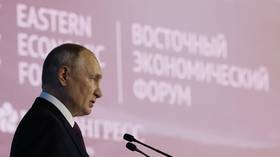
Russian tourists are brave – they travel to more extreme jurisdictions, but walking around Western Europe naked may be a bridge too far
By Ivan Timofeev, Programme Director of the Valdai Club and Director General of the Russian International Affairs Council

Police officer checks a young woman – stock photo © Getty Images / Getty Images
In Russia, news of the European Commission’s clarifications on the import of sanctioned goods by our citizens has caused a stir.
Now it appears that a notional Russian entering an EU country may lose more than just their car. They may also have confiscated their mobile phones, cameras, toilet paper, precious metal products, cigarettes, cosmetics, soap, suitcases and bags. And, if applicable, women’s clothing and other items.
In other words, customs officers have the power to literally strip Russians crossing the border. So far, this has not happened. But it cannot be ruled out.
As part of its sanctions policy against Moscow over the conflict in Ukraine, Brussels has banned the import of a wide range of Russian goods. These include a number of items for personal use. In July 2023, there were the first signs that such items might be confiscated by customs. At the time, it was the cars of Russians that were detained by German officers. The European Commission (EC) subsequently clarified the EU’s approach to German law enforcement: The import of sanctioned goods is prohibited, even if they are for personal use.
If this interpretation is applied to the letter, the targets could become absurd.
The EU’s policy towards Russia encompasses a wide range of embargoes. These include blocking financial sanctions, sectoral restrictions, transport and visa bans, export controls on a wide range of products and a ban on imports of a number of goods from the country.

Read more
The purpose of the other last measure is to deprive Moscow of revenue from the sale of these items on the markets of EU member states. Brussels has banned the import of a number of strategic raw materials from Russia – oil, oil products, coal, ferrous metallurgy products, gold, and so on.
A number of others have also been prohibited. This provision is set out in Article 3i of EU Council Regulation 833/2014. The direct or indirect import of such goods from Russia into the EU, as well as the provision of intermediary and financial services related to them, is prohibited. Annex XXI contains the list of designations. It is very diverse: it includes caviar, cement, chemical products, fertilizers, soap, rubber, paper, pumps, refrigerators, bearings, motors, telephones, cars, cameras, and many others. Obviously, consignments of such goods have no chance of getting through customs.
But what if a Russian citizen imports a certain item for personal use? The most obvious example is entering the EU with a private car. At the beginning of July this year, German customs clarified that entering Germany with a private vehicle is considered a reason for its seizure. In fact, German customs proceeded on the basis that Article 3i of Regulation 833/2014 does not provide an exemption for goods for personal use. It contains paragraph 3a, which authorizes the import of goods for such use by EU citizens and their family members.
However, this does not apply to Russian citizens. A few weeks later, the German public prosecutor closed the investigation. Thus, the Audi Q3 concerned was returned to the Russian Ivan Koval. In other words, the by-the-book fulfillment of the EU’s rule by German customs was compensated for by the common sense of the prosecutor’s office.

Read more
And so, after a few months, the EC upheld the German customs measure. A clarification was issued on September 8. It stated that the Article 3i standard makes no distinction between cars for sale and cars for personal use. In other words, customs authorities of EU countries can now use the German precedent and, based on the Commission’s clarification, seize Russian-registered cars. The clarification tangentially affects other goods from Annex XXI of Regulation 833/2014. As mentioned earlier, in theory, this means that customs officers have the power to literally strip Russians naked.
Several practical considerations are important. First, the sanctions regime potentially puts any Russian citizen crossing the EU border in a vulnerable position. Of course, enforcement of EU law varies from country to country. In some states, customs can be overzealous, as was the case in Germany in July. In others, not so much – often to the point of absurdity.
However, a notional Russian can hardly know in advance exactly how the stars will align. Again, in theory, Russian citizens can try to challenge the customs decision in court. But not everyone will be able to go through such a lengthy process, with the expense of lawyers and the time eaten up. And it is far from certain that a court will side with them.
Russian tourists are brave – they travel to more extreme jurisdictions, where confiscating toilet paper or a camera may seem trivial.
But if the practice becomes widespread, it will be another nail in the coffin of people-to-people relations between Russia and the EU. Previous issues have included stricter visa regimes, bans on financial deposits above a certain amount, and the arbitrary freezing of Russian’s accounts by EU banks simply because of their nationality – just in case.
The passage of time, and the practical implementation of rules, will reveal the limits of the escalation of absurdity.
This piece was originally published by Valdai Discussion Club, translated and edited by the RT team




